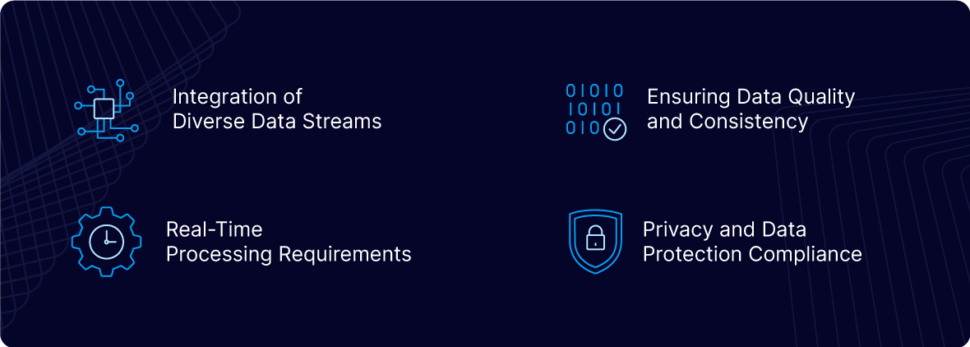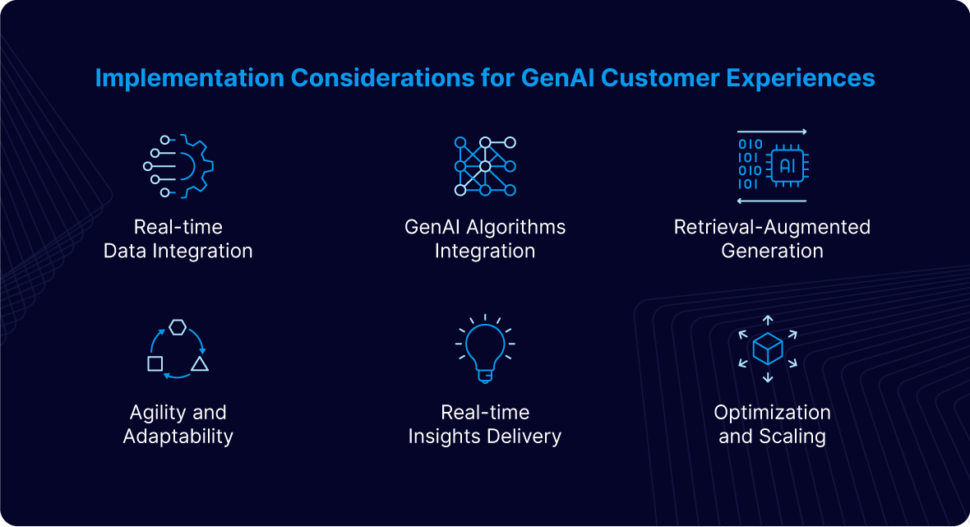The ability to quickly understand and respond to customer demands is critical for staying ahead of the competition. Generative AI (GenAI) is quickly reshaping customer experiences across various sectors. It enables businesses to engage with their clients in real time, providing an unprecedented level of personalization and responsiveness. This innovative approach not only boosts customer satisfaction but also cultivates loyalty and encourages sustained interaction.
The Rise of GenAI in Customer Experiences
GenAI represents a leap in how businesses can leverage artificial intelligence (AI) to glean insights from vast amounts of data instantly. Unlike traditional models, GenAI integrates deep learning and real-time data processing, allowing for dynamic customer interactions that are both contextual and highly personalized. This capability transforms how companies engage with their customers, turning every interaction into an opportunity to understand and react in the moment.
At its core, GenAI involves the use of sophisticated AI models that can process and analyze data in real time, predicting customer needs and preferences. These models are capable of understanding nuances in customer behavior, thanks to their ability to learn from a broad array of data sources, including transactional data, customer feedback, and real-time user interactions.
The Complexities of Implementing GenAI for Enhanced Customer Experiences

When customers look to implement GenAI to enhance their experiences, they face several complex challenges. Integrating diverse data streams from sources like CRM systems, social media, and IoT devices into a cohesive view is both time-consuming and technically demanding. Ensuring data quality and consistency is critical, as poor data can lead to inaccurate insights and ineffective applications, ultimately compromising the customer experience. The need for real-time processing adds another layer of complexity, requiring robust infrastructure that can handle large volumes of data with minimal latency. Moreover, as GenAI applications often use personal data, maintaining privacy and adhering to stringent data protection regulations such as GDPR or CCPA is essential.
Real-Time Personalized Experiences at Scale
One of the standout features of Generative AI (GenAI) is its capability to personalize interactions with customers on a large scale. Businesses are now equipped to customize their offerings in real-time, adjusting dynamically to meet the individual preferences and needs of each customer. From recommending products tailored to a customer’s browsing history to providing personalized discounts at the point of sale, GenAI ensures that these interactions are both fluid and immediate.
In customer support, GenAI significantly elevates service quality. AI-powered chatbots and virtual assistants are capable of managing inquiries and resolving issues efficiently. With each interaction, these tools learn and refine their responses, becoming increasingly adept at providing relevant and useful information. This improvement in response times not only enhances operational efficiency but also boosts customer satisfaction by offering tailored support.

Furthermore, GenAI is transforming the e-commerce landscape by optimizing the shopping experience. It does this through personalized product suggestions generated from a real-time analysis of user behavior and preferences. This level of personalization not only enriches the customer’s shopping journey but also increases conversion rates and fosters greater customer loyalty.
Implementation Considerations

Deploying real-time GenAI requires careful consideration of several factors to ensure successful integration and operation. Here’s how Striim’s platform facilitates these considerations:
- Real-time Data Integration: Striim’s platform leverages a distributed, in-memory streaming architecture to ingest and process data in real time from a variety of sources such as transactional databases, CRM systems, website clickstreams, and social media feeds. The architecture utilizes low-latency messaging systems like Apache Kafka or MQTT for efficient data transportation and employs parallel processing techniques to manage high data volumes effectively.
- GenAI Algorithms Integration: Striim integrates a comprehensive suite of advanced GenAI algorithms directly into its streaming data pipeline. These include various machine learning models (such as supervised, unsupervised, and reinforcement learning), natural language processing (NLP), sentiment analysis, and predictive analytics. The platform supports seamless deployment and execution of these algorithms on streaming data, enabling real-time analysis and insights generation.
- Retrieval-Augmented Generation: Striim’s platform employs RAG for infusing more context into the decision-making capabilities of GenAI systems. This involves integrating real-time data retrieval with AI-driven generation processes, allowing the system to pull relevant historical data or contextual information as it generates responses or recommendations. This enhances the accuracy and relevance of real-time interactions, further personalizing customer experiences and improving satisfaction.
- Agility and Adaptability: The architecture of Striim is crafted for high agility and adaptability, allowing organizations to swiftly iterate and deploy GenAI models in response to evolving business needs or shifts in customer behaviors. Features like model versioning, A/B testing, and dynamic retraining of models based on incoming data ensure that GenAI capabilities continuously adapt and remain effective.
- Real-time Insights Delivery: Striim enables the delivery of real-time insights derived from GenAI algorithms to various customer touchpoints, such as web applications, mobile apps, call center systems, and marketing automation platforms. Integration with downstream systems is facilitated through APIs, message queues, or streaming data connectors, guaranteeing that personalized interactions and recommendations reach customers promptly.
- Optimization and Scaling: Designed with scalability and performance in mind, Striim’s platform is adept at handling increasing data volumes and computational demands as GenAI initiatives expand. The platform can automatically scale out to utilize additional compute resources, including multi-core CPUs, GPUs, or cloud-based instances, ensuring low latency and high throughput even under growing workloads.
Measuring Success
The success of real-time GenAI initiatives can be gauged through several key performance indicators (KPIs):
- Customer Satisfaction and Experience Scores: Measurement through surveys, feedback forms, or Net Promoter Score (NPS) after interactions handled by GenAI systems. An increase in these scores can indicate a positive impact on customer experiences.
- Response Time: Tracking the speed at which customer inquiries are addressed when using GenAI tools such as chatbots or virtual assistants. Shorter response times are typically associated with higher customer satisfaction levels.
- Engagement Metrics: Analysis of engagement levels, such as interaction rates, session duration, and frequency of use, to understand how customers are interacting with AI-driven features.
- Conversion Rates: The effectiveness of personalized recommendations or promotions in converting interactions into sales. An increase in conversion rates can signify successful tailoring of offers and content.
- Error Rate: The frequency of errors or the accuracy of GenAI responses. A decrease in error rates over time demonstrates improvement in AI performance and reliability.
- Operational Efficiency: Reduction in operational costs and time savings resulting from automating customer interactions and processes.
- Retention Rates: The impact of personalized experiences on customer loyalty, observed through repeat interactions or increased retention over time.
- Upsell/Cross-Sell Success Rates: The effectiveness of GenAI in increasing additional sales through relevant recommendations during customer interactions.
By monitoring these KPIs, businesses can gain valuable insights into the effectiveness of their real-time GenAI implementations and identify areas for improvement to enhance customer experiences further.
Transforming Data into Dynamic Customer Engagements in Real Time
Striim leverages real-time data to enhance GenAI-driven customer experiences, providing a direct route to impactful, personalized interactions. As data is generated, Striim enables immediate analysis, allowing businesses to adapt their strategies in real-time based on current customer behaviors and preferences. This capability is crucial for businesses looking to meet individual needs efficiently and stay ahead of market demands.
Our platform supports advanced machine learning analytics, optimizing every customer touchpoint for maximum engagement and satisfaction. By ensuring that interactions are responsive and based on the latest data, Striim not only fosters loyalty but also deepens customer connections, delivering a personalized experience that truly resonates.
To see how Striim can make a real difference in your operations, sign up for a free trial today!





















